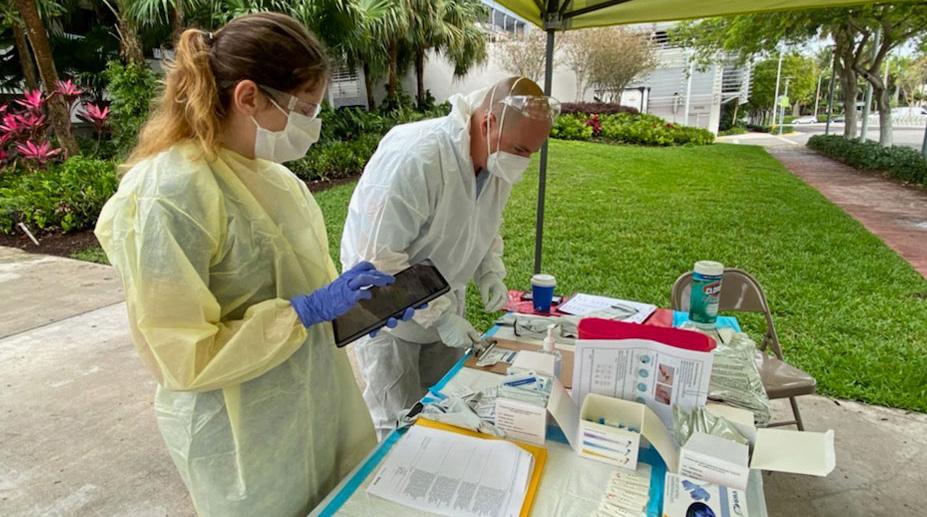
2 minute read
» Sylvester Researchers to Collaborate with Miami-Dade County on Coronavirus Testing
Written by Diana Gonzalez Published on April 3, 2020 Category: Faculty, Initiative
The new testing effort, announced Friday by Mayor Carlos A. Gimenez, will use a finger prick to check for antibodies to the virus in a drop of blood to determine past or present infection.
Advertisement
When Miami-Dade County leaders set out to quantify the extent of COVID-19 infection in the county, they tapped researchers from Sylvester Comprehensive Cancer Center at the University of Miami Miller School of Medicine to lead this effort.
Erin Kobetz and Alberto Caban-Martinez are the director and deputy director, respectively, of Sylvester’s Firefighter Cancer Initiative. They are applying their expertise from earlier research that assesses the burden of cancer among first responders to providing a better picture of how many people in Miami-Dade have been infected with the novel coronavirus.
Miami-Dade already has more confirmed cases than any other county in Florida. Experts believe the number of infections is higher than what’s being reported. estimating disease prevalence, with potentially eight to 10 people actually infected for every single positive test reported in daily statistics,” said Kobetz. “With limited testing availability, we are largely moving in the dark in terms of understanding what is happening locally, including the proportion of asymptomatic individuals who are positive, and how the curve of infection may change as social distancing and stronger shelter in place initiatives are widely practiced.”
She points out that this “community surveillance” for COVID-19 that the county is instituting is the first of its kind nationally and incredibly important for a successful public health response. It’s called SPARK-C, which stands for Surveillance Program Assessing Risk and Knowledge of Coronavirus.
The nasal swab test currently used for screening detects the actual virus and is considered the gold standard when making clinical decisions. This new public health surveillance effort will employ a different kind of test using a drop of blood from a fingertip to check for antibodies to the virus, which signal past or present infection. The company that makes this serologic test has an emergency use application under review by the federal Food and Drug Administration.
Miami-Dade County Mayor Carlos A. Gimenez purchased 10,000 kits to test random cross sections of the county’s population. Florida Power & Light is helping with the process of randomly selecting addresses. Those residents will receive a recorded call from Gimenez, asking if they would like to participate. Those who are interested in volunteering will call a number dedicated to the SPARK-C initiative.
“The phone line will be staffed by public health and medical students from the University of Miami who speak English, Spanish, and Creole,” said Caban-Martinez. “These students will conduct an initial screening and then will schedule the volunteers who consent to one of 10 testing sites designated solely for this community initiative.”
Members of the county’s Emergency Medical Services Ocean Rescue will be administering the finger-prick test. Results will be provided to participants the next day. The Sylvester










